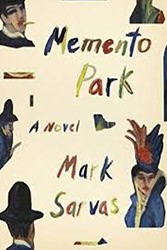In our vast, spinning universe, where stars rarely align and violence and injustice prevail, what choice do people have but to forge ahead in their lives? And what sort of decisions will they make along the way, informed by both their nature and circumstance?
In his debut novel, Nothing Vast, author Moshe Zvi Marvit introduces a multigenerational cast of characters who navigate lives complicated by the Holocaust and its aftermath. At the core of this story, as much a character as a place, is Israel. As Marvit notes, “This book is about the creation of Israel’s mythologies and the way they grew out of family stories and self-identities.”
The novel opens in 1932 in Stawiski, Poland, and ends in Tel Aviv on the precipice of the Yom Kippur War in 1973. Characters find themselves in Casablanca, Paris, New York, and a number of other places. Marvit fully inhabits all of his characters as their stories unfold, regardless of their gender, ethnicity, or age. A young Orthodox woman recalls appealing to her celebrated father, the Rav, for help after the son of another esteemed rabbi raped her. A young Arab Jewish mother in Casablanca dozes off at the beach as her children play, dreaming of Jerusalem and waking up to the stunning realization that her youngest has been washed out to sea. A Polish Jewish refugee in Paris leaves the Sorbonne to join the Underground during World War II, and flees into the sewers when German soldiers spot him.
The lives of these and other disparate characters eventually converge. Some of them form permanent relationships, and others just cross paths. Such encounters have the potential to destroy lives. When a young American Jewish soldier in Israel discovers and reveals to an Arab acquaintance living with her family on his grandfather’s land in Yavneh that men in her family were killed by the Stern Gang in 1947, the soldier’s rabbi grandfather hears that this family was told a “rumor” and displaces them from their generations-held home out of fear of retaliation. Instead of being thanked for his candor, as he expects, the young soldier is despised. “I think we have to remember,” he says to the girl who was once a friend, “that history is to blame here.”
As these and other characters pop up and then disappear, only to reemerge later, the effect can be disorienting. Nevertheless, Marvit’s novel explores themes of truth and justice with nuance and precision. Thoughtful, intricate, and ambitious, Nothing Vast invites readers to consider history and its generational ripple effect. Derived from Antigone, the title refers to how “nothing was simple or painless” — but the book itself is vast in both scope and message. Its characters reflect the decisions and outcomes, good and bad, that come with being human.
Amy Spungen, a freelance editor and writer, has a BS in journalism from Virginia Commonwealth University and an MA in English from Northwestern University. She lives near Chicago in Highland Park, Illinois.





